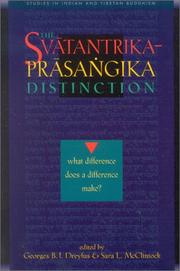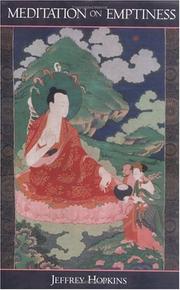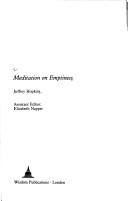| Listing 1 - 6 of 6 |
Sort by
|

ISBN: 9780861713240 0861713249 Year: 2003 Publisher: Boston: Wisdom publications,
Abstract | Keywords | Export | Availability | Bookmark
 Loading...
Loading...Choose an application
- Reference Manager
- EndNote
- RefWorks (Direct export to RefWorks)

ISBN: 0861711106 9780861711109 Year: 1996 Publisher: Boston, MA : Wisdom Publications,
Abstract | Keywords | Export | Availability | Bookmark
 Loading...
Loading...Choose an application
- Reference Manager
- EndNote
- RefWorks (Direct export to RefWorks)
Prasangika --- Meditation --- Prāsaṅgika. --- Prāsaṅgika. --- Sunyata. --- Buddhism.

ISBN: 155939059X 1559390778 Year: 1998 Publisher: Ithaca (N.Y.) : Snow Lion publications,
Abstract | Keywords | Export | Availability | Bookmark
 Loading...
Loading...Choose an application
- Reference Manager
- EndNote
- RefWorks (Direct export to RefWorks)
Dge-lugs-pa (Sect) --- Prāsaṅgika. --- Prāsaṅgika. --- Doctrines.
Book
ISBN: 9781891868207 Year: 2008 Publisher: Boston : Lama Yeshe Wisdom Archive,
Abstract | Keywords | Export | Availability | Bookmark
 Loading...
Loading...Choose an application
- Reference Manager
- EndNote
- RefWorks (Direct export to RefWorks)
"This book begins with a general talk on universal responsibility and compassion that is followed by four chapters detailing the Prasangika Madhyamaka view of emptiness, or ultimate reality, as taught in the Gelug tradition of Tibetan Buddhism, and how to meditate on it, according to the author's personal experience"--Provided by publisher.
Dge-lugs-pa (Sect) --- Prāsaṅgika. --- Lam-rim. --- Doctrines.
Book
ISBN: 9783631628720 3631628722 Year: 2013 Publisher: Frankfurt am Main : Peter Lang Edition,
Abstract | Keywords | Export | Availability | Bookmark
 Loading...
Loading...Choose an application
- Reference Manager
- EndNote
- RefWorks (Direct export to RefWorks)
This study focuses on the devices implemented in classical Indian texts on ritual and language in order to develop a structure of rules in an economic and systematic way. These devices presuppose a spatial approach to ritual and language, one which deals for instance with absences as substitutions within a pre-existing grid, and not as temporal disappearances. In this way, the study reveals a key feature of some among the most influential schools of Indian thought. The sources are Kalpasūtra, Vyākaraṇa and Mīmāṃsā, three textual traditions which developed alongside each other, sharing - as the volume shows - common presuppositions and methodologies. The book will be of interest for Sanskritists, scholars of ritual exegesis and of the history of linguistics. - Cover.
Tantrism --- Prāsaṅgika --- Philosophy, Indic --- Śrautasūtras --- Criticism, interpretation, etc. --- Prāsaṅgika. --- Philosophy, Indic. --- Tantrism. --- Ritual. --- Indische Philosophie. --- Hinduismus. --- Mimamsa. --- Hiraṇyakeśī Satyāṣādha. --- Śrautasūtras --- Śrautasūtras. --- Śrautasūtra. --- India. --- Hinduismus --- Śrautasūtra --- India --- Prāsaṅgika. --- Śrautasūtras. --- Tantrism - India --- Ritual

ISBN: 0861710142 9780861710140 Year: 1983 Publisher: London Wisdom
Abstract | Keywords | Export | Availability | Bookmark
 Loading...
Loading...Choose an application
- Reference Manager
- EndNote
- RefWorks (Direct export to RefWorks)
Prasangika --- Madhyamika (Buddhism) --- Central philosophy (Buddhism) --- Chūgan shisō --- Mādhyamikaśāstra --- Middle doctrine school (Mahayana Buddhism) --- Middle school (Mahayana Buddhism) --- Sūnyavāda (Buddhism) --- Buddhist philosophy --- Mahayana Buddhism --- Buddhism --- Mādhyamika (Buddhism) --- Meditation --- Dhyāna (Meditation) --- Meditation (Buddhism) --- Meditation (Lamaism) --- Buddhist doctrines --- Buddhist theology --- Lamaist doctrines --- Doctrines --- Tantric Buddhism --- Zen Buddhism
| Listing 1 - 6 of 6 |
Sort by
|

 Search
Search Feedback
Feedback About UniCat
About UniCat  Help
Help News
News